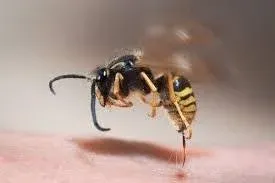When people ask, “what is a wasp’s lifespan?”, the answer depends on the type of wasp and its role in the colony. While some wasps live for just a few weeks, others especially the queens can survive almost an entire year. Understanding their lifespan helps explain how wasp colonies grow, thrive, and eventually die out each season.
1. The Average Wasp Lifespan
In general, most wasps live between 12 and 22 days. However, the exact duration varies widely. Worker wasps, for example, have the shortest life expectancy, while queens enjoy a much longer and more purposeful existence.
2. Lifespan by Wasp Type
Queen Wasps
Queen wasps are the foundation of every colony. They can live up to 10–12 months, surviving through winter by hibernating in safe, sheltered places like logs or attics. In spring, they emerge to start new colonies and lay eggs, ensuring the species continues.
Worker Wasps
Worker wasps usually live 2–4 weeks. These sterile females spend their lives building nests, gathering food, and protecting the colony. Because of their constant activity, they often die sooner than the queens.
Male Wasps (Drones)
Male wasps live only a few weeks. Their main role is to mate with new queens, and once they complete this task, they die shortly after.
3. Seasonal Lifespan Differences
Seasonal changes play a big role in what is a wasp’s lifespan. During spring and summer, the colony thrives, producing workers and drones. However, as autumn and winter approach, most wasps die due to cold temperatures and lack of food. Only fertilized queens survive by finding a warm place to overwinter.
4. Environmental Factors That Affect Lifespan
Several factors influence how long a wasp lives:
Temperature: Cold climates reduce lifespan, while moderate temperatures support longer survival.
Food availability: Wasps need nectar, insects, and sugary substances to thrive.
Predators: Birds, spiders, and humans often shorten a wasp’s life span.
Habitat: Urban areas or disturbed nests can reduce life expectancy due to stress and exposure.
5. How Humans Impact Wasp Lifespans
Human activity, such as pest control or habitat destruction, significantly affects what is a wasp’s lifespan. When people remove nests or use insecticides, colonies collapse early. While this helps manage infestations, it also reduces natural pollination and pest control that wasps provide.
6. Why Understanding a Wasp’s Lifespan Matters
Knowing how long wasps live helps you handle encounters with them more effectively. For instance, wasp activity peaks during late summer, so taking preventive measures earlier in the season can help avoid infestations. Furthermore, understanding their life cycle supports safer and more eco-friendly pest management methods.
Conclusion: The Circle of a Wasp’s Life
So, what is a wasp’s lifespan? Most wasps live only a few weeks, but queen wasps can last nearly a year, ensuring their colony’s survival. Their lives are short yet essential for balancing ecosystems. From pollination to natural pest control, wasps play a vital role in nature even if their buzzing presence often makes us uncomfortable.






